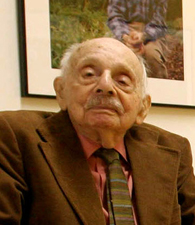Stanley Kunitz was destined to be a poet. Kunitz once said, “There was so much joy in playing with the language that I couldn’t consider living without it,” and the two-time Poet Laureate didn’t spend any of his 100 years living without his poetry.
Stanley Kunitz’s Early Days
Stanley Kunitz was born on July 29, 1905, in Worcester, Massachusettts. As a child he would scour the dictionary for a new word each day—but not just any word. “It was a big word, a word like eleemosynary or phantasmagoria,” he told Elizabeth Farnsworth of PBS. Once Kunitz had stumbled upon a word to his liking, he’d run outside, shout the word out loud, and revel in the sounds.
Kunitz stayed in his home state for his studies, earning a bachelor’s degree from Harvard College in 1926 and a master’s degree from Harvard a year later. Kunitz joined the Army during World War II, and afterwards taught at Bennington College in Vermont, followed by teaching positions at Columbia University and the University of Washington, among other institutions.
Sources in this Story
- PBS: U.S. Poet Laureate Stanley Kunitz speaks with Elizabeth Farnsworth
- Academy of American Poets: Stanley Kunitz
- Encyclopedia Britannica: Stanley Kunitz
- Fine Arts Work Center in Provincetown: About
- Poets House: About Us
- NPR: Stanley Kunitz at 100
Kunitz’s Poetry
Kunitz first began publishing poetry in the 1920s, and his first book, “Intellectual Things,” was published in 1930. Some of the work from his first book, along with work from his second book, “Passport to War,” was included in his book, “Selected Poems 1928-1958,” for which Kunitz won the Pulitzer Prize in 1959. Kunitz continued to write poetry and publish collections as books into his 90s.
Kunitz was the United States Poet Laureate (then called the consultant in poetry) from 1974-1976. On October 12, 2000, Kunitz became U.S. Poet Laureate for a second time. In a 2000 interview with PBS, Kunitz talked about his father’s suicide, and losing several of his close artist friends later in life.
He also discussed how he brings his work to fruition. “I think a poem lies submerged in the depths of one’s being. It’s an amalgamation of images, often the key images out of a life. I think there are certain episodes in the life that really form a constellation, and that’s the germinal point of the poems,” he said.
Dedicated to helping other poets, and giving them a supportive place to hone their craft, Kunitz was heavily involved with two organizations devoted to writers and artists.
He was one of the founders of the Fine Arts Work Center in Provincetown, Massachusetts. According to the Work Center’s Web site, “the founders envisioned a place…where young artists and writers could live and work together in the early phase of their careers.”
In 1985, Kunitz founded Poets House in New York City. The organization is a national poetry library, and plays host to poets and literary events that “stimulate public dialogue on issues of poetry in culture.” The Poets House praised Kunitz for his mentoring efforts with younger poets.
The Rest of the Story
Kunitz granted NPR an interview on July 28, 2005, the day before he reached 100 years old. “I don’t want to talk about my health or longevity…I think everyone knows I’m not a youngster, and that’s all right with me,” he said in a warm, crackly voice before reading his poem, “The Long Boat.” Kunitz died on May 16, 2006, just a few months before his 101st birthday.
This article was originally written by Sarah Amandolare; it was updated June 27, 2017.











